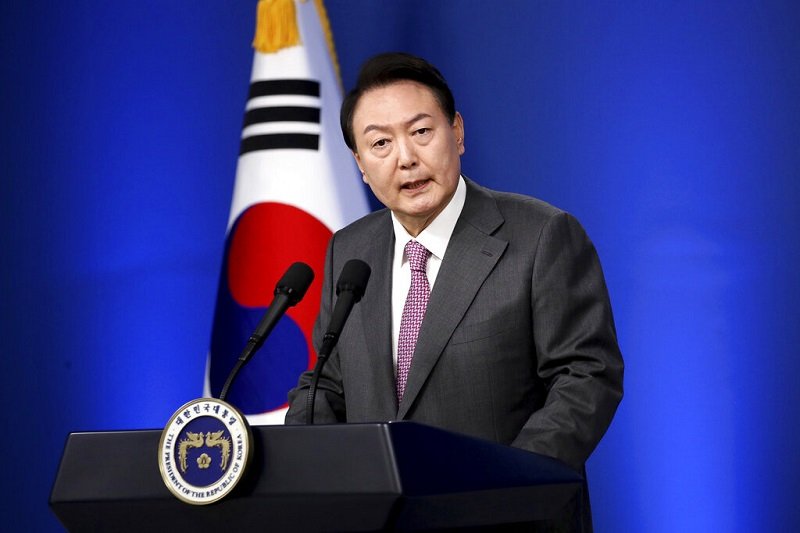
South Korean President Yoon Suk Yeol speaks during a press conference at the presidential office in Seoul on Wednesday.
15:25 JST, August 18, 2022
SEOUL — South Korean President Yoon Suk Yeol on Wednesday expressed willingness to resolve the issue of the court rulings regarding former wartime requisitioned workers from the Korean Peninsula, saying he is considering ways to compensate the plaintiffs while avoiding diplomatic friction with the Japanese government.
Yoon made the remarks over the major stumbling block to Japan-South Korea relations during a press conference on his 100th day in office.
The Supreme Court of Korea ordered Mitsubishi Heavy Industries, Ltd. and Nippon Steel Corp. to pay compensation to former requisitioned workers and the rulings have been finalized. The top court may soon make a decision on the order to liquidate MHI’s assets in South Korea.
“We’re now fully considering a plan that would allow the plaintiffs to receive compensation in a way that doesn’t conflict with the sovereignty issues that the Japanese government is concerned about,” Yoon said.
The Japanese government has long maintained that the issue of claims by former requisitioned workers has been settled under the 1965 Agreement on the Settlement of Problems Concerning Property and Claims and on Economic Cooperation between Japan and the Republic of Korea. Yoon’s reference to “sovereignty issues” is believed to refer to this position.
Yoon appears to envision measures such as subrogation in which a fund is created by Japanese and Korean companies to pay compensation to the plaintiffs.
“The historical issue can be resolved amicably through concessions and understanding,” Yoon said, if Japan and South Korea strengthen future-oriented cooperation. It appears that the South Korean president recognizes the need for compromise between the Japanese government and companies and Korean plaintiffs, but he did not refer to specific steps to be taken.
Top Articles in World
-

China Confirmed to Be Operating Drilling Vessel Near Japan-China Median Line
-

China Eyes Rare Earth Foothold in Malaysia to Maintain Dominance, Counter Japan, U.S.
-

Japan, Qatar Ministers Agree on Need for Stable Energy Supplies; Motegi, Qatari Prime Minister Al-Thani Affirm Commitment to Cooperation
-

North Korea Possibly Launches Ballistic Missile
-

10 Universities in Japan, South Korea, Mongolia to Establish Academic Community to Promote ICC Activities, Rule of Law
JN ACCESS RANKING
-

Univ. in Japan, Tokyo-Based Startup to Develop Satellite for Disaster Prevention Measures, Bears
-

JAL, ANA Cancel Flights During 3-day Holiday Weekend due to Blizzard
-

China Confirmed to Be Operating Drilling Vessel Near Japan-China Median Line
-

China Eyes Rare Earth Foothold in Malaysia to Maintain Dominance, Counter Japan, U.S.
-

Japan, Qatar Ministers Agree on Need for Stable Energy Supplies; Motegi, Qatari Prime Minister Al-Thani Affirm Commitment to Cooperation























